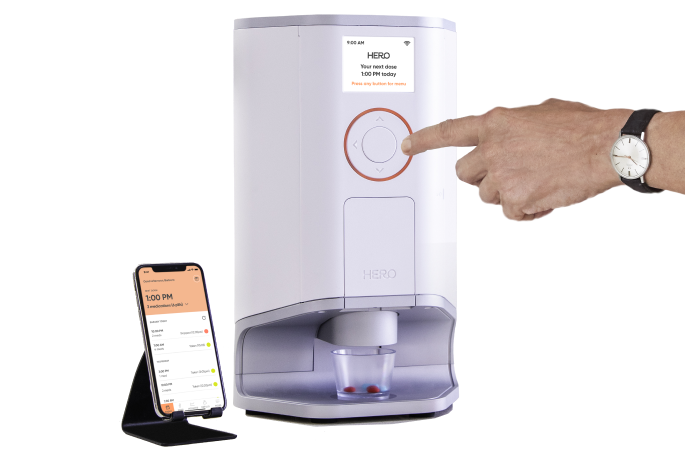15 Empowering Questions to Ask About New Medications

Being prescribed new medications can cause anxiety. You may be afraid of how the medicine will affect your quality of life or become stressed about accidentally missing a dose.
These feelings are normal. And instead of being ashamed of them, consider investigating them. What exactly is causing you to worry? Pinpointing specific concerns can help you formulate medication questions, which can empower you to feel in control of your health.
So when you’re at your next doctor’s appointment, come in prepared with a list of questions to ask about new medications, and write down the answers your doctor provides. Here is a list of 15 questions to get you started:
Questions to Ask About New Medication
1. What is the name of the medicine?
Be sure to ask how to both pronounce and spell the name of your medication, so you can easily communicate this information to another provider or loved one in the event of an emergency or other medical appointment.
2. What is the medication for?
Be as specific as possible with this question and ask:
- Which condition is it treating?
- How will it improve my medical condition?
- What is the overall goal for my treatment?
Knowing the answers to these questions is empowering, as you become aware of whether the prescription medication is doing its job to improve your health.
3. Why this medication?
New medicines may have harmful interactions with those in your current medication regimen, which is why your doctor may prescribe one drug over another.
4. Are there any interactions with the medications or supplements currently in my routine?
Each doctor you see should know the name of every medication, supplement, or herbal product you take, and how they may interact with one another. This knowledge helps prevent your doctor from prescribing you a medicine that could have harmful drug interactions.
5. Are there any side effects?
Every person reacts differently to medications. Some people are completely fine, others get a headache or nausea, and a small percentage have serious side effects. However you react, awareness of potential side effects helps you understand if your symptoms are common, serious, or something else entirely, like a prescription overdose.
6. How much does it cost? Will insurance cover it?
Prescription drugs can be extremely expensive, especially if they’re brand names, and insurance won’t cover all medicines. In cases where the medication is too expensive, consider the question below.
7. Is there a generic version?
Generic drugs can be half the price of their brand name counterparts and still contain the same active ingredient.
8. How long, how often, and when do I take it?
Every year, medication nonadherence contributes to an estimated 125,000 deaths and as much as 10% of all hospitalizations. For this reason, it’s crucial to be aware of medication safety and ask your doctor about how to take your new prescription:
- When should I take my medication? Before bed, first thing in the morning, or another time?
- How often and for how long? Once or twice a day? For only a few weeks, or over the course of many months or longer?
- With or without meals? While it’s common for many medications to be taken with food, some should be consumed on an empty stomach.
9. How do I store it?
Storing your prescription drugs improperly is one of 5 simple medication mistakes you’re probably making. Some drugs may need to be stored in the fridge, while others can be kept in your kitchen or bedroom. Heat, light, and humidity can alter the effectiveness of your medication, the latter of which is one of the main reasons you should avoid storing prescriptions in your medicine cabinet. Yes, really, the myth of the medicine cabinet is something many people are unaware of, and you should keep your medications out of your bathroom!
10. How do I know it’s effective?
For some problems like high blood pressure or diabetes, you can use tools like a blood pressure monitor or continuous glucose monitor (CGM) to see if the drugs are working. For other conditions, like depression or chronic headaches, you can simply observe how you feel.
Track your symptoms in a diary on a daily basis to see if there’s any improvement in your health condition. While the effects of some drugs can be felt within an hour, others may take as long as four to six weeks to reach full therapeutic level. Note that your doctor is the best person to give advice on this question, because he or she knows your medical history and your unique medication regimen, which could both influence a drug’s effectiveness.
11. What are the risks vs the benefits?
And do those risks outweigh the benefits? For example, you’d probably want to avoid pain medications with severe risks to treat a headache. On the other other hand, a prescription drug with potentially serious side effects may be worth taking for chronic conditions like diabetes or high cholesterol.
12. Are there non-drug alternatives?
Exercise and dietary changes can sometimes be used as an alternative to medication. As for herbal supplements, many doctors will likely be skeptical because they haven’t undergone the same rigorous clinical trials and tests that medication has. Still, if you take supplements or are thinking about it, be sure to tell your doctor. They can have harmful interactions with the drugs that can make them less effective.
13. What do I do if I miss a dose?
When prescriptions pile up, it can be easy to miss a dose. Medication errors do happen, which is why it’s important to talk with your doctor before one occurs, so you know how to act. Sometimes a missed dose will be harmless, while other times it could have serious consequences.
To help prevent missed doses, you can set reminders for yourself, use a pill box system, or try something more sophisticated like Hero’s medication management service. The Hero smart device gently reminds you when to take your pills, and dispenses the right amount of your medications at the right time. Along with their device, Hero’s integrated app is akin to a virtual medication management assistant; it sends you medication reminders, lets you know if a dose was missed or if any pills are running low, and even tracks your adherence with personalized reports. This frees your mind from constant worries of medication adherence and allows you to fully engage in your life—spending more quality time with friends and family.
14. Should I avoid anything while taking this drug?
You may need to stop consuming certain foods, drugs, and alcohol because they could decrease the effectiveness of some medications. You may also need to avoid physical exertion or driving if a drug causes sleepiness, low blood pressure, fatigue, or other symptoms. Be sure to ask your doctor if you’ll need to stop any of these habits or hobbies.
15. When will you check my progress with me?
Not all medications need to be taken indefinitely, so ask your healthcare provider when to schedule a followup appointment to see how the drug is working and whether you should increase or decrease your dosage.
Approach Your Next Doctor’s Appointment with Confidence
Before your next visit to your doctor’s office, empower yourself by preparing the right questions. Knowledge is your friend, and any feelings of uncertainty can be put at ease when you get to the heart of your concern with a specific question.
Hero can also relieve the stress of new medications by helping you maintain your medication schedule, keep track of all your drug information, and seamlessly incorporate new prescriptions into your regimen. Learn more about how it works or give us a call at 1-855-855-9962 to speak with one of our friendly representatives.
Complex med schedule? We solved it.
Hero’s smart dispenser reminds you to take your meds and dispenses the right dose, at the right time.

The contents of the above article are for informational and educational purposes only. The article is not intended to be a substitute for professional medical advice, diagnosis, or treatment. Always seek the advice of your physician or other qualified clinician with any questions you may have regarding a medical condition or its treatment and do not disregard professional medical advice or delay seeking it because of information published by us. Hero is indicated for medication dispensing for general use and not for patients with any specific disease or condition. Any reference to specific conditions are for informational purposes only and are not indications for use of the device.



